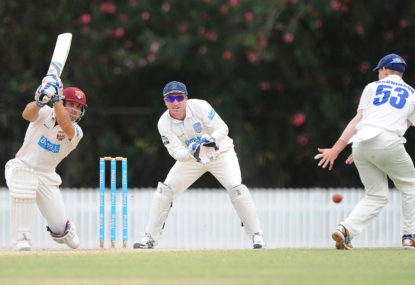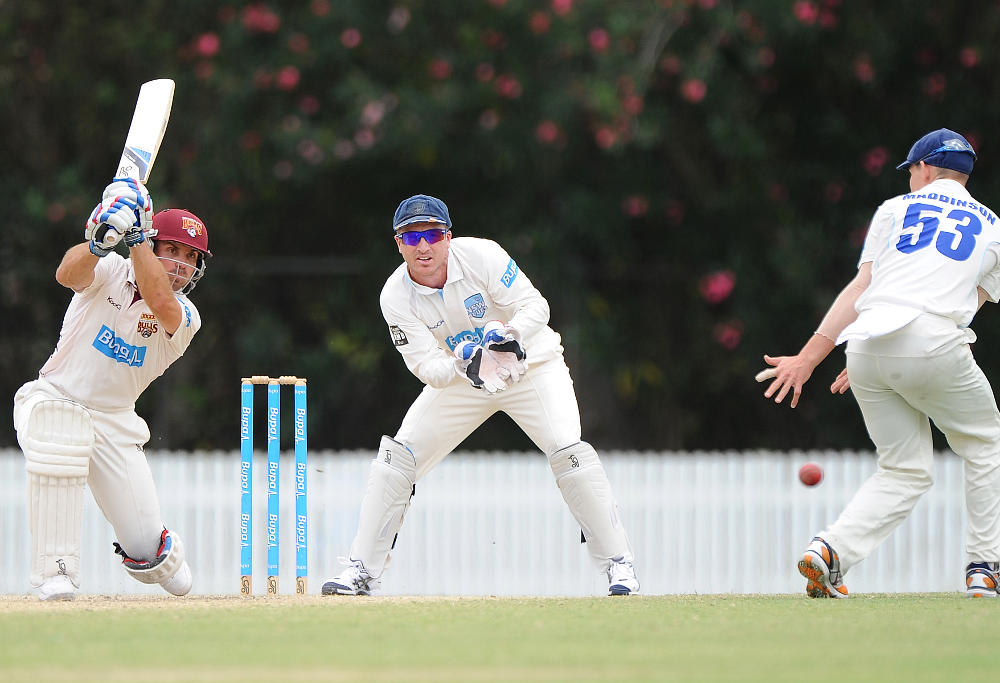Stoinis clubs stunning IPL ton, makes tough chase look a cinch with clutch final-over barrage
Marcus Stoinis produced his first IPL century and it was a beauty. He went 6, 4, 4, 4 to finish off the Lucknow Super…

There is always something special about meeting your sporting hero.
It’s the summer of 1991. After spending the late ’80s wandering the cricketing wilderness, Australia is back on top, and have given England a thumping in the Ashes.
In the western suburbs of Brisbane, a young Chris Hartley is re-enacting the highlights in his front yard. He throws a ball against the brick wall, before picking up the bat to play a sparkling cover drive.
Suddenly, the game is interrupted by a blue Pajero heading down the street. As per the rules set by the umpire (Mum), the Test match grinds to a halt.
The car pulls up to the kerb and the driver’s window slowly rolls down. Looking out is Australian captain Allan Border, who has a grin on his face.
“[He] said ‘G’day mate’ and gave me the thumbs up,” Chris remembers.
“I reckon it completely stopped me in my tracks at the time. Mum said that I came running in the front door and could hardly even speak. I was that excited.”
That eight-year-old, playing cricket with bat, ball and a brick wall, would go on to play 131 first-class games for Queensland, and become the most successful wicketkeeper in Sheffield Shield history.
On the surface, Chris seems like an easy-going guy. But dig a little deeper, and you find a man who is dedicated to the game and to the art of wicketkeeping.
Since debuting on the domestic scene in 2003, Chris has been one of Queensland cricket’s most loyal servants, winning four one-day and two Sheffield Shield titles with the Bulls.
“Winning a final or a championship, those are the strongest memories because that’s why we are out there playing,” says Chris.
“It’s a huge amount of work to win a four-day or five day game of cricket. And to be able to do that over the course of a season and then to win the final, a lot of people wouldn’t understand the amount of work and the time and energy that you and your teammates put in.”
[latest_videos_strip category=”cricket” name=”Cricket”]
The two titles Chris won with Queensland were incredibly different. “The first one [in 2006], I was a youngster in a side of champions,” says Chris.
“The second Sheffield Shield that we won [in 2012], myself and James Hopes were the senior players, we really had to stand up. That was the game I was man of the match, where I got a hundred in the final, and that was very satisfying.”
Ever since he picked up the gloves, in the under 10s at Kenmore Cricket Club, Chris wanted to play for Australia. He progressed quickly through the junior system, often playing above his age.
After cutting his teeth playing grade cricket for the University of Queensland, he soon faced his next big challenge – entering a Queensland squad stacked with talent. Alongside national stars like Matthew Hayden and Andrew Symonds, the side contained local legends like Jimmy Maher, Martin Love and Stuart Law.
The man Chris would replace was Wade Seccombe, who himself had achieved great success at domestic level, yet never managed an international appearance. The two of them struck up a close friendship during their time in the squad together.
“[Wade] was an absolute superstar wicketkeeper for Queensland,” Chris recalls. “He’s a fantastic gentleman and was always willing to give advice, always willing to listen, always willing to help me.
“That first game, he didn’t say a lot other than to go out there and enjoy myself, but he did leave a handwritten note in my locker, which was a really nice, personal touch.”
Chris’ first-class debut was in late 2003, as the Bulls hosted South Australia at the Gabba, recently renovated into a concrete colosseum. The Redbacks struggled on the bouncy wicket, managing just 204. When Chris came in to bat, Queensland were 5-225, with a slender 21 run lead. The game was in the balance.
“There were nerves because it was something new, I was playing with some of my heroes in that game,” says Chris. “[But] when you play at a level for the first time, you don’t have many expectations because you’ve never been there.
“You sort of play with a lot of freedom so I was able to go out and try and convert the nerves into a lot of excitement and have a lot of fun with it, and that’s what I did.”
Chris scored 103, putting on a 218-run partnership for the seventh wicket with Ash Noffke. The Bulls ended the innings with a 297-run lead, which South Australia couldn’t overcome, as Queensland won the match by an innings and 137 runs.
Chris was the first Queenslander since Matthew Hayden to score a first-class century on debut. But even though his spot in the team seemed secure, Chris wasn’t willing to rest on his laurels.
“I think it was Wally Grout who once said, ‘Never give a sucker an even break’ when it comes to your wicketkeeping position. Never give anyone a sniff. There’s only one spot and if someone takes it, well, you’re sitting on the sidelines,” Chris says.
“I remember someone else saying that, if you’re the fifth best batsman at a club, you’re still playing first grade. If you’re the fifth-best wicketkeeper, you’re playing fifth grade, so simply by numbers you need to never take your position in the side for granted.
“That makes wicketkeepers very hungry and determined.”

Chris remained a hungry and determined player throughout his career. He played over 100 consecutive games for Queensland, that streak ending last month, when he encountered a hand injury he couldn’t overcome.
His form didn’t wane with age; He averaged 76 with the bat in his final season, head and shoulders above the competition. Even as his career wound to a close, he remained dedicated and committed to the game.
“I made it a goal that I wanted to be the number one choice for as long as I could,” Chris says.
“That meant there was a lot of work, a lot of preparation and a lot of fitness that had to go into it, but I loved playing the game, and it’s those things that drive you through the tough times, to make sure that you keep enjoying the cricket that you are playing.”
Coach Phil Jacques played against Chris during the latter stages of his career, before taking his first coaching job with Queensland in 2015.
“He was a really determined, gritty, hardworking player who always seemed to bail his side out of trouble,” Phil says.
“I think that grit and that determination and the sheer single-mindedness to do the best possible job for the team and be accountable for every moment he was in really rubbed off on the playing group. I think it was something that he was always renowned for as a player and having him in your team and being one of the leaders was great for a coach starting out in the game.”
Despite his first-class achievements, when Chris chose to hang up the gloves in March, the baggy green had eluded him. One could argue that his career blossomed at the wrong time; he was too young when Adam Gilchrist retired in 2008 and too old when Brad Haddin was dropped from the side in 2015. But Chris leaves the game having no regrets.
“I know that my ability and my performance warranted selection at different times. But was the window of opportunity open to be picked? Probably not,” Chris says.
“My parents always taught me that whatever you are doing, anything in sport or in life, all you can do is your best. I know that I did everything that I could and I know that had an opportunity presented itself, my game would have been up for it.
“Yeah, there are frustrations on the way, where I felt that I was doing my best and I wasn’t getting picked. [But] that’s life and you don’t always get what you want in life. So, you take solace in doing your best, day in, day out.”